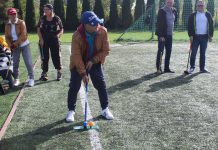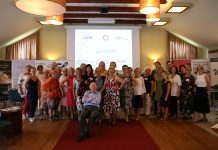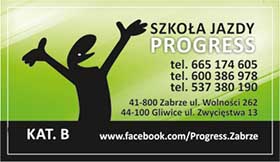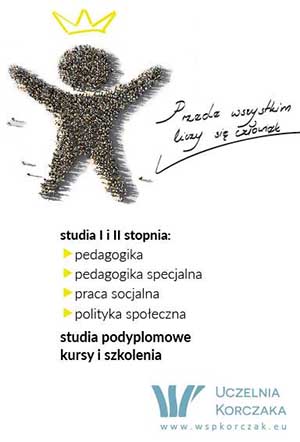The unjust mark of a bad parent or a bad child

I work with children having the Asperger syndrome on a daily basis – as a therapist and a mum. I don’t consider the disorder itself as a problem, but the approach to the syndrome as demonstrated by public institutions constitutes a serious problem. The phrase “tip of the ice-berg” seemed to be the most accurate one in my reflections, and I am presenting here only a small piece of the phenomenon I have been analyzing.
Being a teacher with almost thirty years of experience, I often meet colleagues at various trainings or conferences. Discussions held in the corridors are sometimes related to problems of students with Asperger or ADHD syndrome. I have witnessed complaints about unusual behavior of children, or I have heard opinions about parents being critical. When I tried to explore that issue, I faced a wall. Officially – most teachers don’t want to admit insufficient qualifications or skills in working with such children.
Therefore, I went to the Director of Education Department in a small town. My aim was to obtain the approval to go to schools not only to carry out surveys (within the lifelong education scheme), but most of all to talk with teachers and parents. I proposed to do research, surveys about co-operation between parents and schools in terms of the mentioned topic. I heard an answer that “in our town we don’t have such problems (meaning the students)”. I tried talking to the Head of Education Department in a big city – here I also didn’t get the permit to do research.
So in the turbulence of a school life and our daily life there is “such a thing” as Asperger, but it obviously it is safer not to touch this issue. The issue which is a tip of the ice-berg. On top if it there is a diagnosed student who due to the opinion on special education is included under the Individual Education-Therapeutic Program (IPET), and “under the water” there are lots of dangers.
When I realized that my activities didn’t bring any effects, I decided to change the topic and show what is “under the waterline”. I hope that the scientific analysis presenting this complex problem will save a lot of unnecessary mental suffering or pain of being not understood or rejected.
“Trajectories (experiences) of institutional oppressions, family entanglements, cases where children having Asperger syndrome and their families have been rejected by the society”. In my reflections I will refer to real life situations which the students or their caretakers experienced. In some cases very painful (!), but unfortunately this is the reality and life in Polish conditions “in the shadow of Asperger”.
Just like to sailors’ lives the dangers are invisible elements of the submerged ice-berg, the hidden incidents are a serious danger when creating the self-esteem, social interactions (being already abnormal in case of Asperger syndrome) and the feeling of rejecting young people. They often imply secondary disorders, which could be: behavioral disorders or resistance-rebellious disorders. There is also the issue of whole families which are affected directly by these oppressions or through the child’s suffering.
I have participated for many years in meetings with parents of children having the AS (Asperger syndrome)/ADHD and I have occasions to hear opinion about their co-operation with the school (public). Some of them are satisfied with contacts. They praise the system of support given to their child. Usually in such situations there are no bigger problems at school, and parents hoping to be understood attend meetings at schools. It is a pity these are only individual cases.
I am mother of two children – a son and a daughter affected by ADHD and Asperger sydnrom, and a pedagogic therapist. In spite of this, together with my children we have been through hell when contacting schools and other institutions. In order to protect my son from discrimination caused by the school, I had to appeal to the Ombudsman for Children, in some other situation to the Director of the Regional Committee for Examinations. The Committee “did us a favor” and wrote a letter to the court asking to investigate the child’s background situation. We won the case, but the time and health I wasted (all year) won’t be returned.
It turned out we are not exceptions. A large group of parents complains about co-operation or lack of it. On portals devoted to ADHD or Asperger syndrome you can notice many complaints of parents about institutions, which instead of giving support, cause unnecessary suffering, worries and pain. When there are problems – many caretakers are powerless. I don’t mean helplessness with elements of impotence, but rather a feeling of double fear (!). The first one is about measures that can be applied by an educational institution to them, and secondly to their child. In the opinion of the institution such a parent is “an antagonist” and gets a direct message that he or she is “a difficult parent”, who has demands or who needs pedagogisation. As revealed in the analysis of caretakers’ experiences, the probability that their child is “lost” after some interventions is high. The school as an institution can victimize “the disobedient parents” who want to fight for a dignified treatment of their child affected by Asperger, as presented on the example of our family.
Such situations are recalled by the Ombudsman for Disabled Children, Agnieszka Dudzińska, PhD:
schools sometimes look for a dependency between the child’ disability and the alleged negligence in education. Even if there is some dependency based on statistics, it is impossible to define clearly what the result and the cause are! Many parents become stigmatized, and the child’s disability raises distrust among both parents and teachers, and also other parents.
I have noticed a certain (ir)regularity. The education supervisors control the support given to disabled students, by checking only the documentation and talks with the school head teachers. In my research I haven’t had information that a parent of a child affected by Asperger syndrome has been requested by an inspector or superintendent about opinion on the psychological-pedagogical help given at schools. And there would be a lot to comment about. I will describe a few flagship slogans that parents hear from the head teachers when enrolling a child into a middle school or high school, when informing that the child has been diagnosed with Asperger syndrome.
-
We don’t want such children here!
-
Could you take the child away from our school?
-
If we had known the child has Asperger syndrome, we would have not admitted him/her to our school!
Sometimes these are more subtle discouragements, for example:
-
Your child will not feel good here, the school has large corridors.
-
This is a big school, there is enormous noise in the breaks.
If a parent in some schools hears such comments, he/she can resign – take the child away from the school, or for the child’s own good act “humble”. And what happens if – as I have shown – the parent decides to fight for a decent treatment of his/her child?
How to raise the student’s self-esteem, when he or she hears many times, in the whole school year time from the teacher, deputy headmaster, offensive insults? Such a situation took place in one of the schools in Silesia. A teacher insulted a student affected by Asperger syndrome. What a different approach compared to the assumptions of IPET (INDIVIDUAL EDUCATIONAL-THERAPEUTIC PROGRAME), in which the student was included. As Professor Zimbardo claims “the Polish school destroys children”. In his opinion the symptoms of depression among children and adolescents are the result of being rejected by the family, friends, but most of all by the school: The enemies are mainly those teachers who make students feel worse so that they retreat into themselves. A student feels humiliated when a teacher laughs at him or her, points out the weaknesses – says a professor of the Stanford University. What in such situations will the co-operation with a disabled student look like for his or her good?
The Ministry of National Education and the Centre for Education Development provided the headmasters, teachers and even parents with large quantities of materials concerning students with SPE. These materials have been written in a comprehensible way and they discuss all aspects of SPE. However, these are often theoretical guidelines and assumptions, and their execution is far from being perfect.
Other institutional oppressions are mentioned also by A.Dudzińska, PhD :
The Ministry of National Education doesn’t register at all the cases where schools apply to family courts for access to information about a disabled child’s background. From what the parents say we know that a threat of addressing a case to the court or sending a superintendent is an element of forcing parents to be obedient to the school (for example, backing down on a demand to change the institution, submitting an application for a diagnosis or a decision).
Another issue arises because often a family is sent by court to RODK (Center for Family Diagnosis and Consultation). Here during a five-hour marathon a child affected by Asperger / ADHD solves a lot of tests, undergoes two interviews. The caretakers fill in the Parental Behavior Scale. They are judged among others by how an autistic child perceives them. The child is unable to behave in social situations, has not empathy, is egocentric and has problems with communication.
I will quote the opinion of expert witnesses about a mother who thanks to a few years of rehabilitation managed to “put her child on its feet”. Step by step she compensated the child’s shortages through games, exercise, therapies and pharmacological treatment. Gradually, properly to the child’s age and health needs she paid for classes that supported the child’s development. What did she find out about her? :
[…] the mother is inefficient in terms of the child education, she cannot get through to the child’s deeper emotions (affected by Asperger syndrome!), doesn’t suit the boy’s needs in terms of development and emotions … The research tools we apply in our work must be standardized based on the nationwide population”.
We may only think to what extent the perception of the world by a boy with Asperger syndrome befits “the nationwide population”. Should “the nationwide population” tests have an application in case of youths affected by Asperger syndrome and ADHD? Let us think whether they are a kind of oppression, or maybe a pressure on the person undergoing tests and having the specific disorder? I will refer to the great scientist Simon Baron-Cohen who is the author of the test for potential Aspergers persons. He stresses that when formulating questions, the following should be considered:
[…] quite often the problem of persons with Asperger syndrome or high-functioning autism it inability to understand a written instruction/a question, […] during formulating questions persons with such disorders were invited and it was checked how they understood the phrases […] whether the persons with Asperger syndrome could judge on their own their social and communication skills (due to subtle differences in mind reading). Because such persons get an impression that their behavior is a common standard, it might have led to lowering the test result.
At a conference on Neuro-developmental aspects of the cognitive concept of a therapy for children with autism spectrum (DSW, Szczecinek 7.03.2015) I gave a lecture entitled “(Non)existing research tools applied when giving opinion about families with children affected by Asperger syndrome or/and ADHD, which caused quite an uproar in the room. I indicated there that some questions are unsuitable in the tests on parental behavior research or behavior of parents to children.
We also face the institutional oppression of the Team for Disability Adjudication. I have been observing for years the process of issuing decisions on disability by medical boards and the phenomenon I have seen is unusual, it is in direct proportion to impoverishing the funds allocated to attendance allowances. This phenomenon is sudden, miraculous recoveries of children as yet disable, and who at the time of graduating from the middle school are in many cases considered to be affected by mild disability or healthy. After turning 16, together with a legal guardian I go to the medical board … for adults. Why the adjudication is not carried out after having reached maturity?
According to our legislation such a decision deprives young people from further institutional support. They are not entitled to attendance allowance and can’t apply (in case the parent resigns from work) for carer’s allowance. This lack of support at the last stage of education is really harmful to families, and for young people affected by Asperger syndrome it is acting against their functioning. It is known that this disorder is characterized by repetitive behavior, rituals and unchangeability of certain behavior or habits. At that time (16) a student with Asperger syndrome starts another stage of education. So in case of problems with functioning in the new school reality, a parent pays the costs (sometimes a few hundred zloty monthly) of a specialist therapy. A young person with Asperger syndrome should receive support at least until finishing the high school!
My considerations here did not refer to theoretical aspects of Asperger syndrome or methodology that I will use when writing a thesis. I have not included family entanglements, because this issue is different than the two aspects I will discuss. I wanted to present what can’t be analyzed with tests, surveys or with the help of available research tools. How to measure the pain of being rejected? How to develop an indicator of a child intolerance by others – to what values should it be recalculated to? What to do with an improper imprint of “a bad mother” or “a bad father”? How to relate the supposed educational incapacity to the enormous effort parents put into rehabilitation and shaping of social skills in a child affected by Asperger syndrome? Many parents attend various trainings, course, seminars, or conferences on children/students having educational problems or shortfalls.
Persons affected by this syndrome usually have a high level of intelligence or above the average. The fact they have problems with feeling empathy doesn’t mean they don’t feel. They often see around them improper behavior or strict reactions of the institutions, schools or the society. To sum up, I will refer to a very important sentence from the lecture which I gave at the First National Conference on Methods and Workshops entitled: Pedagogic therapy at work with a disable child (UMCS Lublin 9.05.2014):
These are parents, teachers, therapists who teach a child affected by Asperger syndrome about norms of behavior, which the child doesn’t always follow due to its disorder. So if we aren’t successful in any of these roles, if we don’t act as a “role model” – how the Asperger’s person is supposed to map it?
What can be our sonar who takes the family through life without difficulties, traps, institutional oppression or risk of being rejected by the society?I hope that I will find the right answer by carrying out further research of “the tip of the ice-berg versus Asperger syndrome”.






































































